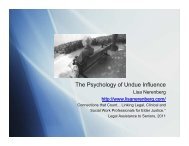Undue Influence: Definitions and Applications - California Courts ...
Undue Influence: Definitions and Applications - California Courts ...
Undue Influence: Definitions and Applications - California Courts ...
You also want an ePaper? Increase the reach of your titles
YUMPU automatically turns print PDFs into web optimized ePapers that Google loves.
ear a confidential relationship to one another, a confidential or authoritative relationship<br />
between the parties need not be present when the undue influence involves unfair advantage<br />
taken of another's weakness or distress.”<br />
Some have attempted to distinguish “normal” influence from that which is “undue”<br />
(Blinder, 2003; Quinn, 2001). Blender (2003) contends, for example, that while convincing frail<br />
or disabled people to take actions they might otherwise not take may be influence, it only<br />
becomes “undue“ when the action is in the service of the influencer’s own interests <strong>and</strong> the other<br />
elements are present. Coffey & Cummings (2000) observe that even when influence is exercised<br />
in the execution of a will, even when it coercive, is not “undue” if it does not change the<br />
preexisting disposition of the testator. That, is, if the bequest or gift would have been made<br />
anyway, absent the influence, then no undue influence has occurred. Making this determination<br />
obviously, requires knowledge of the testator’s long-term wishes <strong>and</strong> intentions.<br />
Disagreement also surrounds the factors that render people susceptible to undue<br />
influence, or what makes “weaker” parties weak. Perhaps the most controversial factor is<br />
cognitive impairment. Although most experts list cognitive impairment, including dementia, as a<br />
significant factor, most also contend that it is not required <strong>and</strong> that anybody can be unduly<br />
influenced under the right circumstances. As described earlier, however, many have observed<br />
reluctance by courts to determine that someone with capacity has been unduly influenced<br />
(Naimark, 2001; Turkat, 2003).<br />
Distinguishing undue influence from other factors affecting free will is difficult because<br />
multiple factors are often present in cases. For example, in will contests, contestants frequently<br />
allege both lack of mental capacity <strong>and</strong> undue influence (Blinder, 2003). Similarly,<br />
conservatorship petitions frequently cite lack of mental capacity as well as undue influence<br />
among the reasons for the filing. Duress, which is “any unlawful threat or coercion used...to<br />
induce another to act [or not act] in a manner [they] otherwise would not [or would],” (Black’s<br />
Law Dictionary, 1990) is another threat to free will that is likely to be alleged along with undue<br />
influence. Duress is often used interchangeably with menace.<br />
The extent to which other specific impairments play a role has also been the subject of<br />
disagreement. Spar, Hankin, & Stodder (1995) note that there is disagreement among expert<br />
115




